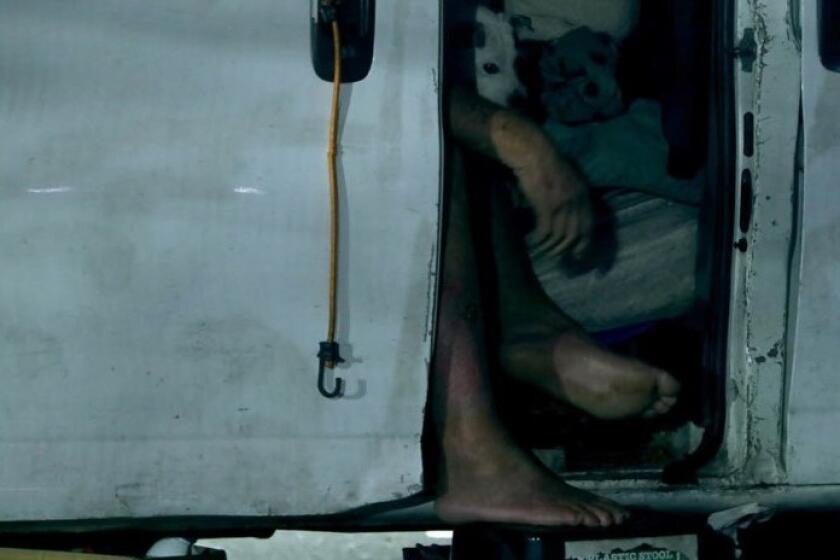Homeless advocates urge Orange County to create a safe parking program for people living out of vehicles
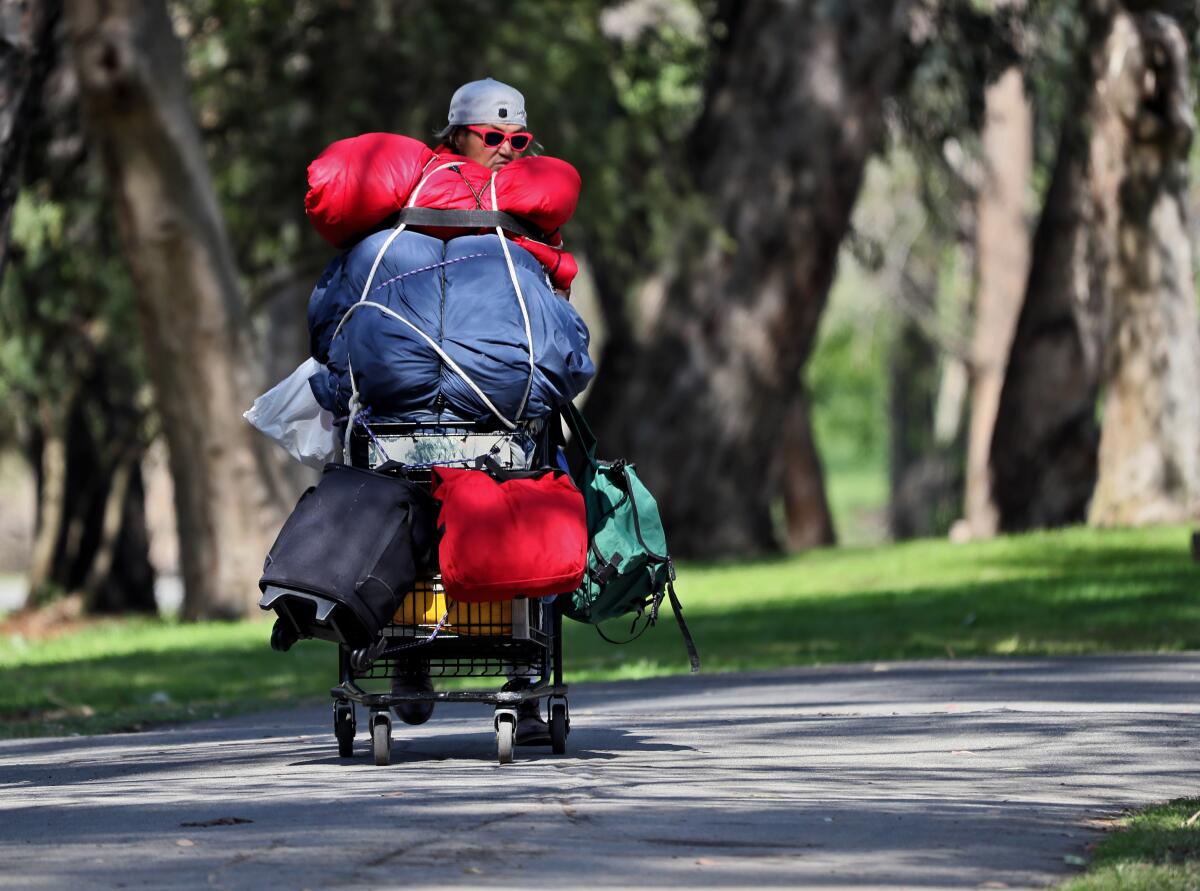
- Share via
For about a year during the coronavirus pandemic, dozens of homeless people living out of their vehicles parked on Valencia Drive in Fullerton.
The street served as a kind of imperfect haven for them, where they didn’t need to constantly move their vehicles every couple days to avoid parking citations or expose themselves to the dangers of parking in an unknown area. Then the city decided weeks ago to start enforcing parking regulations that it had temporarily halted due to the pandemic.
Since then, the homeless have been cleared from the street and have scattered throughout the county, said Father Dennis Kriz of St. Philip Benizi Church.
Kriz and other religious leaders had been working to connect the homeless who lived on Valencia with supportive services and housing options. The group of homeless advocates are known as the Tri-Parish Homelessness Collaborative, which is made up of St. Philip Benizi, St. Mary’s and St. Juliana Falconieri Catholic churches in Fullerton.
The collaborative served as the major voice advocating for the homeless who lived on Valencia. The group had also been pushing the city to bring back its former safe parking program, which provided a parking lot for homeless people to park their vehicles in. Fullerton ran Orange County’s first safe parking program, but it shut down in January after running out of funding.
For homeless people who live in their cars, finding a safe place to park is a major obstacle. With many cities having overnight parking prohibitions, the homeless are forced to park in unsafe areas that put them at risk.
The city ended up partnering with the religious leaders to try and connect the homeless with services before bringing back the parking regulations. But Kriz said only six people were helped before the city reinstituted its parking enforcement. He said that four were connected with Fullerton’s homeless navigation shelter and the collaborative was able to pay for two other people’s RV to be fixed so they could relocate to live with family in Oregon.
“So, six people have been helped and the rest have been scattered,” Kriz said. “So the problem hasn’t really gone away.”
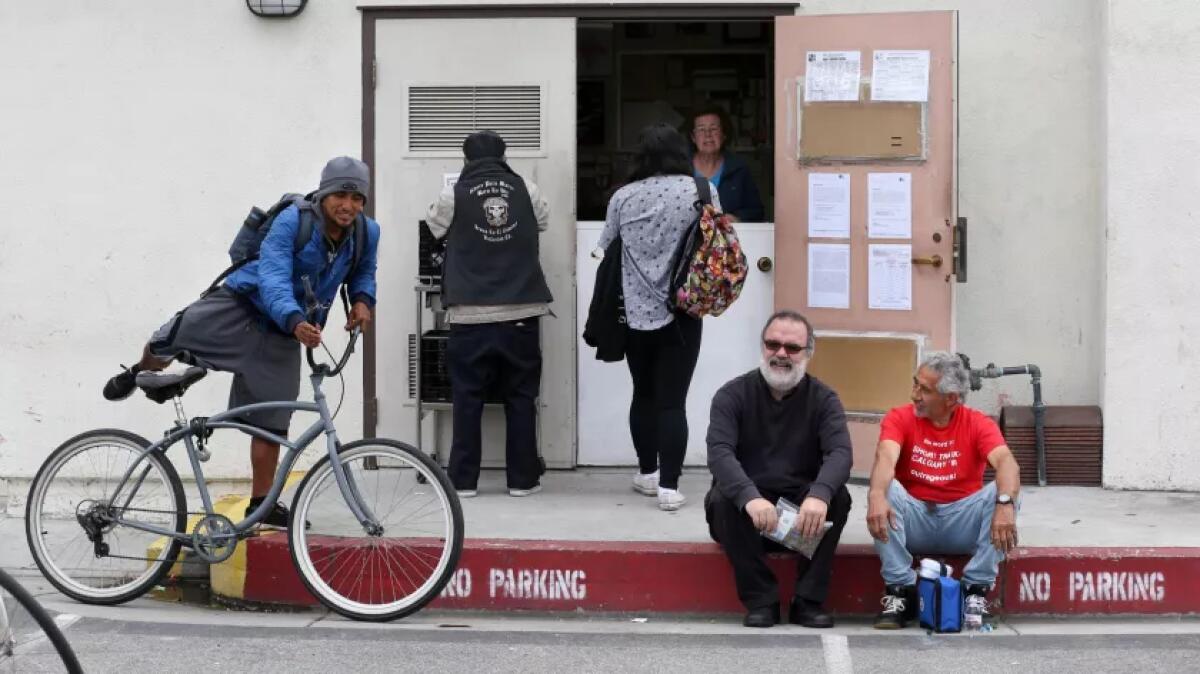
The city has continually said it would not bring back its safe parking program but would be supportive of a more widespread program. The collaborative has since focused its efforts on pressing officials for a countywide program. What happened on Valencia highlights the need, Kriz said.
“Every day that these folks are not at some designated parking lot, they are scattered throughout the county, parking in places that they probably shouldn’t be,” Kriz said. “The faster that the city or the county responds to this, the sooner they will have less RVs parked throughout the county.”
Kriz said the collaborative will be meeting with the city and county to propose their idea for a countywide safe parking program. Kriz didn’t want to divulge specifics of the program prior to the meeting.
Christa Johnson, interim deputy city manager of Fullerton, said in an email that the “city is working with the faith-based community, county and state officials on safe parking programs” and is hosting meetings every two weeks to continue the discussions regarding a regional safe parking program.
Kriz did say that the collaborative will be presenting the city and county with potential sites for a program. David Gillanders, executive director of Pathways of Hope — which worked with Fullerton on its safe parking program, said finding a site is the major obstacle to a countywide safe parking program. He said that somebody needs to step forward with a parking lot that can be dedicated for the program. This could include a city, county, college or businessperson.
“The current thing was that there’s no place to put this program, but we’re saying there are places,” Kriz said. “Without getting too much into the details of what places, but we have definite ideas.”
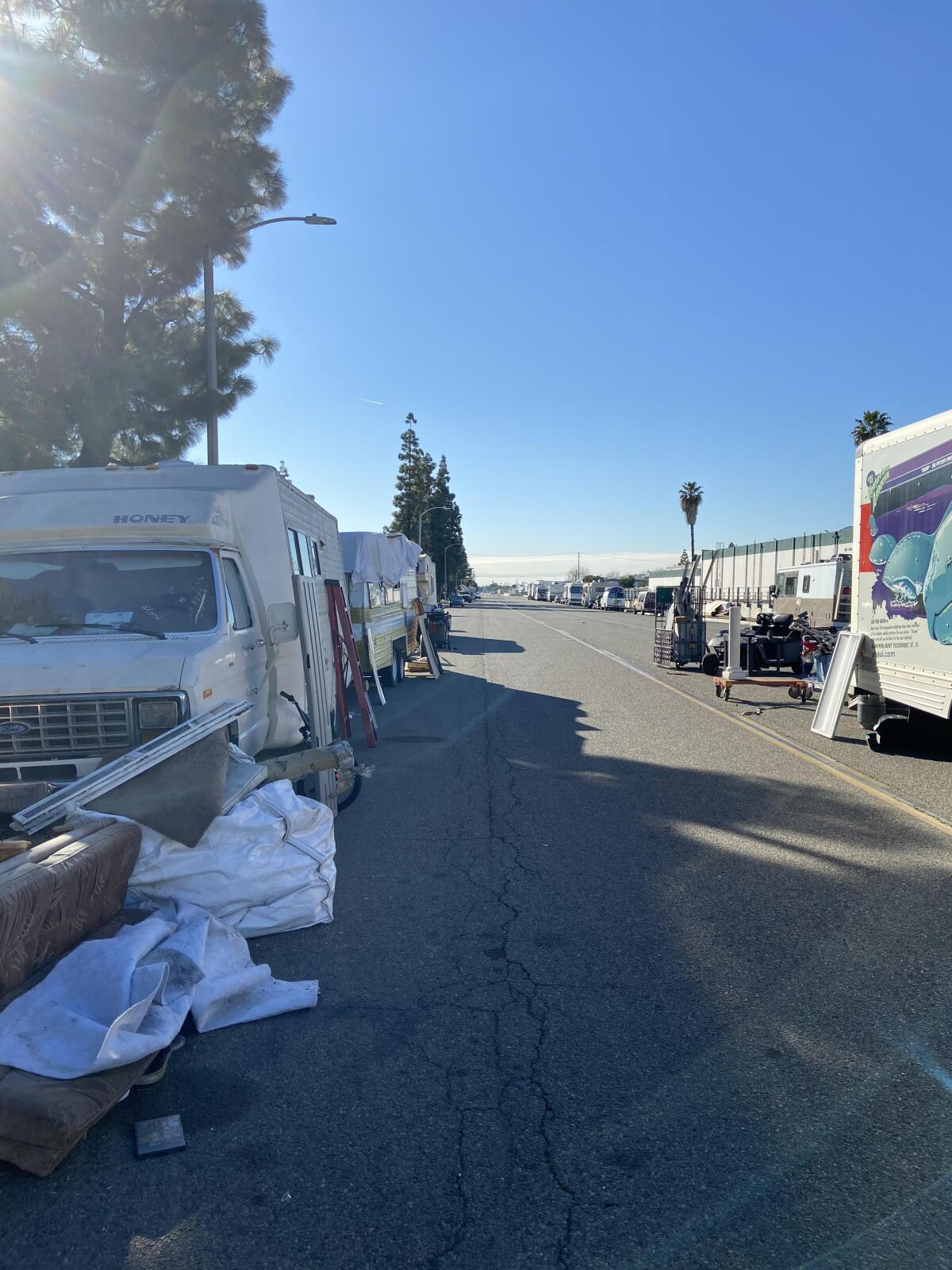
Jason Austin, Orange County’s director of the Office of Care Coordination, said in an email that the county would only consider a safe parking program if there was support and interest from a city to operate the program. He did not mention Fullerton.
“The county aims to work collaboratively with its 34 cities in operating and creating programs that effectively address homelessness incorporating evidenced-based practices,” Austin said. “To operate a safe parking program according to common practice, there has to be an expectation for participants to provide ownership of vehicle documentation, current registration, insurance coverage and valid driver’s licenses with a focus on linking participants to shelter, housing or supportive service programs. The supportive service programs can include physical and behavioral health, housing, employment — needed services to assist in the process of becoming housed.”
The county and activists appear to agree on the general goal of any potential safe parking program.
Austin said a safe parking program shouldn’t just offer a place to park for the night, but it should also provide an opportunity for governments and service providers to engage with homeless people so they can eventually be connected with housing and move out of their vehicles.
Gillanders and Kriz said a countywide safe parking program that connects people with permanent supportive housing is needed.
The ‘Park Walk-Along’ will rotate through Huntington Beach’s Pier Plaza, Edison Park, Central Park, Greer Park and Linear Park-Sunset Beach, from 8 a.m. to 4:20 p.m.
Austin pointed out that many people who live out of their RVs tend not to consider themselves homeless. He said this complicates the discussion surrounding safe parking programs because they are not looking to be connected with housing.
Like Austin, Gillanders drew a distinction between safe parking programs and people who live out of their RVs, stating that many people who live in their RVs consider it a home and are just looking for a safe place to park rather than looking to be connected with housing.
Gillanders said there are about 50 safe parking programs throughout the state, and most of them connect people with services with the intent of getting them into permanent housing.
“I think a safe parking program, first and foremost, does have to be an idea that we are finding housing for these people that they can afford and that they can stay in, so they don’t have to stay in a vehicle full time,” Gillanders said. “Whether you’re in an RV or a car, if that’s a program you want to participate in, we should make that available. If you’re in an RV and you’re looking to stay in an RV, I think that’s a different kind of program that’s not quite the same thing. It’s got a different intent and a different purpose when it is structured around allowing people to stay in their vehicle in perpetuity for as long as they want.”
Gillanders and members of the Tri-Parish Collaborative had their qualms with the Fullerton safe parking program and hope any countywide program will improve on its deficiencies.
Gillanders said the major problem with the Fullerton program was that it was too exclusionary. He wasn’t in favor of the program only allowing people who were connected to Fullerton and who didn’t have criminal backgrounds.
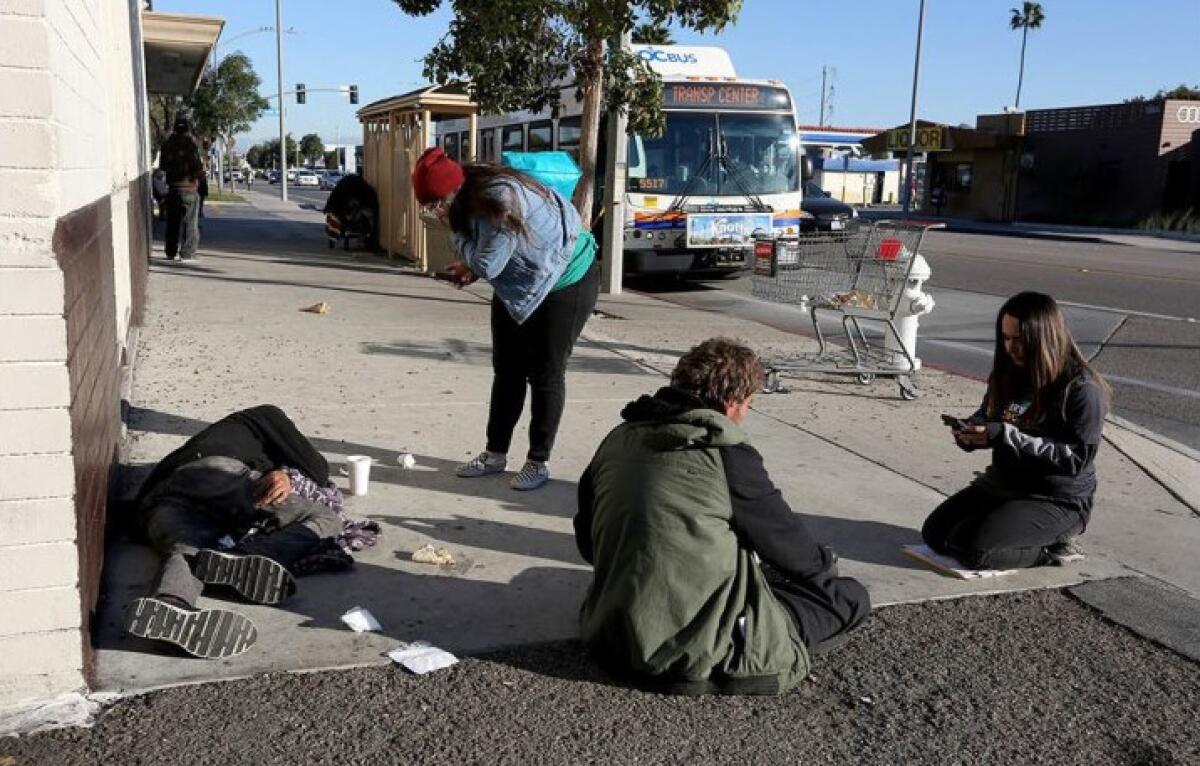
“If you have an active warrant, I think that’s one thing,” Gillanders said. “If you have a criminal offense from 15 years ago, I think that’s an entirely different thing. So, I would like to see some reengineering of that to have some ability to work with people despite what’s happened in their past.”
Kriz echoed those sentiments.
“There are a lot of homeless folks who would have a fairly long list of rather trivial citations and arrest warrants that would impede them from getting into programs,” Kriz said.
Kriz pointed to Shely Youngbauer, who wasn’t allowed into Fullerton’s safe parking program due to a felony from about 15 years ago. With the help of the church, Youngbauer was able to relocate to Oregon to be with family.
“She was not allowed to participate in the program even though it was long ago and she had certainly done her time,” Kriz said.
Youngbauer said in an interview that the safe parking program would be helpful because it could provide an avenue for people to get into housing without having to stay in a homeless shelter. Youngbauer said many people who live in their RVs are resistant to go to homeless shelters because it requires you to give up your vehicle, and COVID-19 outbreaks have occurred in the shelters. Orange County shelters have also been criticized by advocates and have faced an American Civil Liberties Union lawsuit that alleges sexual harassment and poor conditions.
Youngbauer had once co-owned a Round Table pizza and was a part of the Chamber of Commerce. But financial ruin struck a few years ago and she was forced to live out of her RV with her son. After staying on Valencia, the pair were able to travel to Oregon to be with Youngbauer’s brother after receiving help from the churches.
“I’ve never seen so many people be so vicious, like with venom, towards a group of people, as they were to the people on Valencia,” Youngbauer said. “It’s like, ‘Hey, why do I scare you? Is it because you realize that it could happen to you?’ Because it can happen to anybody. Yeah, I never dreamed this would happen to me. And yet it did, and it wasn’t because I was drinking or on drugs or anything. It’s just, I was financially set back.”
The Fullerton program also required vehicle searches of the participants. Kriz questioned the legality of this and pointed to the fact that for a homeless person living out of their car, they were essentially subjecting themselves to have all their belongings searched on a regular basis.
“We will certainly be saying that we want a program that will be used,” Kriz said. “If the rules are too strict and arguably unconstitutional — if you’re requiring a nightly search of vehicles — that’s going to make it really hard for people to participate.”
Gillanders was also critical of the required vehicle searches.
“I think the way to think about it is, I’m not really sure what we’re expecting to find that’s going to change our motivation to help someone in moving out of their car into permanent housing,” Gillanders said. “If we found substances, how does that change our priority of trying to get somebody into housing? There’s plenty of people who are housed, and they use substances. If you find a weapon, that might be a little bit of a different thing but I don’t necessarily know what inspires us to do such invasive searches right off the bat.”
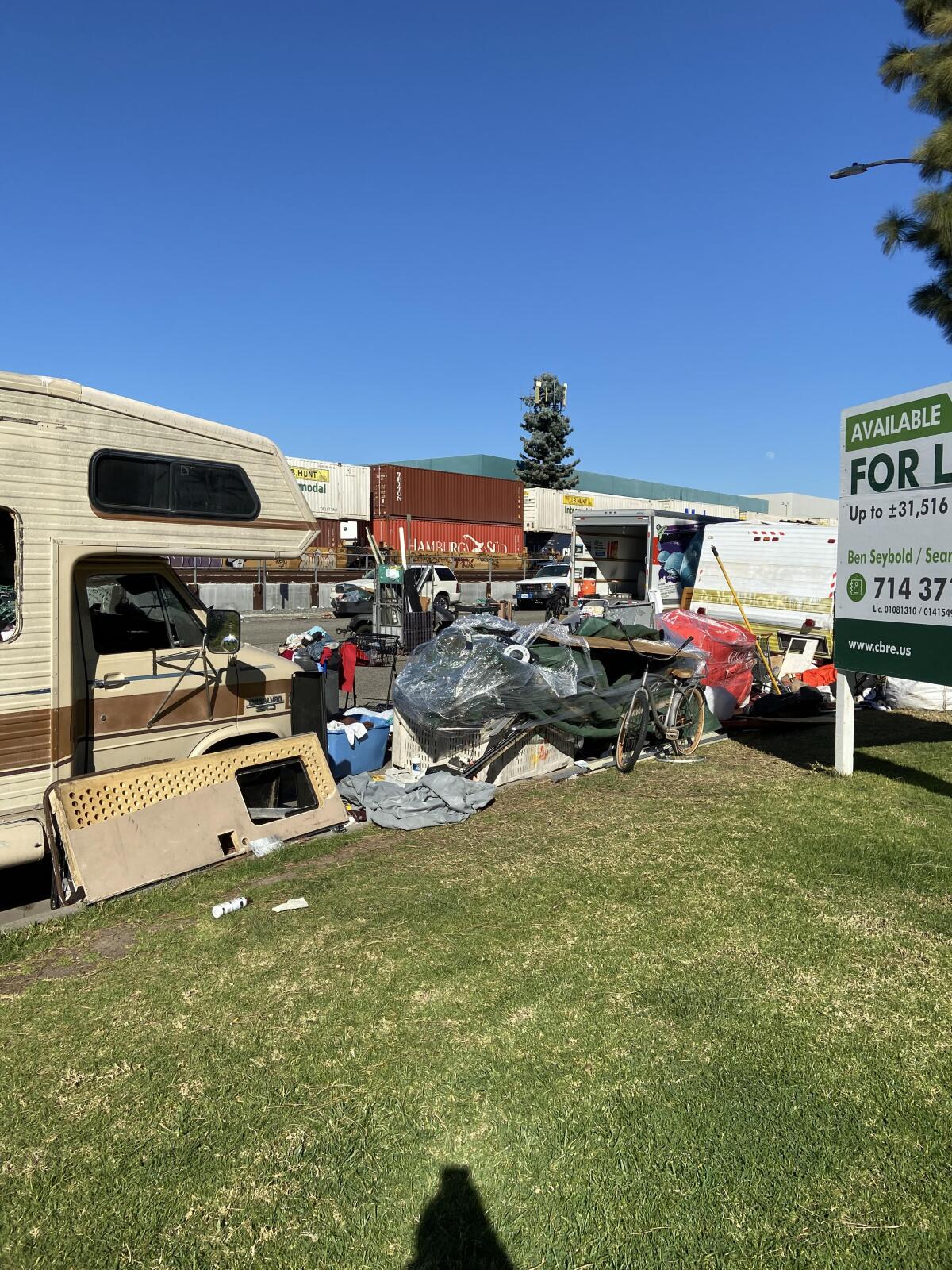
Yet the need for a safe parking program is becoming more urgent as the number of homeless people living out of vehicles has increased due to the pandemic economy. Gillanders said that number will only grow.
Nonprofit-driven safe parking programs exist in Los Angeles and San Diego.
“The housing prices here are just as exorbitant,” he said. “COVID is going to probably continue to create this slippery slope of people who fall through the cracks ... we need to be prepared for an even greater influx of people who need this kind of resource.”
People living out of their vehicles have to contend with a variety of parking regulations throughout Orange County, some of which require a vehicle to be moved after 72 hours and other oversized vehicle laws that make it challenging for people to find safe places to park.
Mark Hamlet, who lived on Valencia, said he is now once again being chased out of spots regularly by police. Hamlet has been living out of his RV for decades and said he is conscientious when deciding where to park his vehicle, avoiding neighborhoods and businesses with heavy foot traffic.
“There weren’t any oversized vehicle ordinances back when I started doing this,” Hamlet said. “They’re harassment and they’re discriminatory.”
Hamlet said he would consider a safe parking program if it didn’t require any vehicle searches.
“If I had to be subjected to any search, then I can tell you, that’s no place I will go,” Hamlet said. “I’m not on parole or probation, and I retain all of my 1st, 2nd, 3rd and 4th Amendment rights.”
Gillanders said the RV and parking ordinances that many cities have, effectively criminalizes homeless people who live out of their vehicles.
“Cities just have to decide the cost-benefit of just criminalizing people that do live in their vehicles versus trying to create an opportunity for them to stay somewhere,” Gillanders said.
When asked what the county currently does to help homeless people who are living out of their vehicles, Austin said that the county provides a broad range of services for those experiencing homelessness, including those who are living out of their vehicles.
“The county operates homeless street outreach contracts that engage people living on the streets and connects them to emergency shelter and/or housing programs,” Austin said. “The county also operates emergency shelters that individuals can access that provide safe beds to sleep, access to meals, showers and onsite supportive services. Our ultimate goal is to engage individuals experiencing homelessness and support their transition out of sleeping in situations that are unsuitable for human habitation and into a housing opportunity.”
All the latest on Orange County from Orange County.
Get our free TimesOC newsletter.
You may occasionally receive promotional content from the Daily Pilot.
